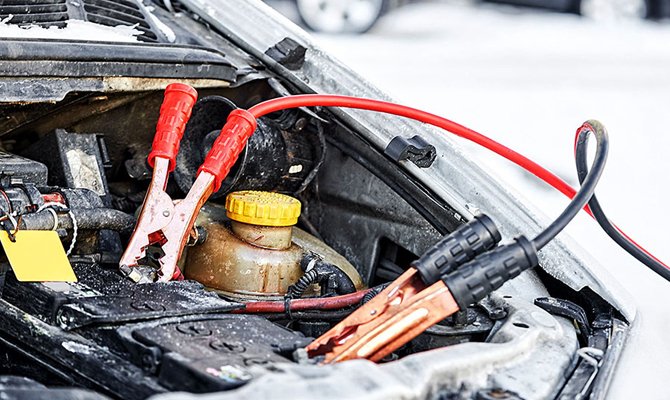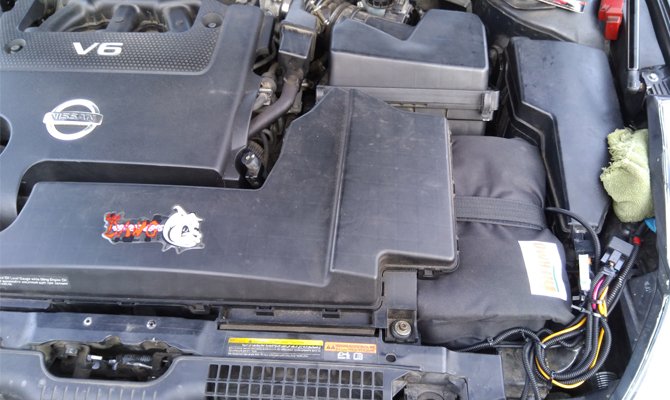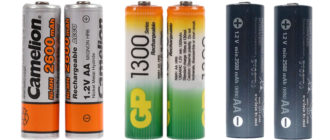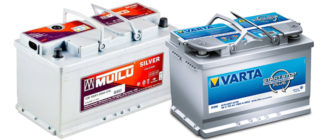Car operation in the winter season is fraught with many difficulties. In addition to replacing rubber, engine oil and washer, it is also necessary to take care of the battery performance during this period.
Late maintenance of the battery can lead to disastrous results. The electrolyte inside the battery may freeze, as a result of which lead plates may be destroyed and even depressurization of the housing may occur.
Content
Why does the battery freeze in the car
As you know, the electrolyte is a mixture of sulfuric acid with distilled water. Electrolyte densitysold in the network is 1.27 - 1.28 g / cm3. With such density indicators, the liquid will freeze at a temperature of about minus 70 degrees.
Therefore, if during the preparation of the electrolyte there were no serious violations, then you can safely use the battery even during severe frost. Ice formation in the battery case can occur as a result of a strong decrease in this indicator.
A drop in electrolyte density in a battery can occur for the following reasons:
- With frequent addition of distilled water.
- Strong battery drain.
In the first case, a decrease in the density of the electrolyte can occur with different intensities. If the decrease in the electrolyte level occurs due to evaporation, then as a result of the addition of distilled liquid, it is possible to almost completely restore the original density value. If this operation has to be performed as a result of depressurization of the battery or spraying the water-acid mixture, the addition of water will lead to a significant decrease in the density of the electrolyte.
A strong discharge of the battery is possible not only under heavy load from a large number of electrical appliances, but also when the car is idle. Even a new battery, at rest, discharges with an intensity of at least 0.1% per day, and old batteries can completely discharge in this way within 1 to 2 weeks. Especially if it's cold outside.
At what temperature does the battery freeze
If the battery is 100% charged, the electrolyte will not freeze in the cold. When using a serviced battery model, you can use the hydrometer to precisely set the freezing temperature of the battery.
The ratio of the density of the electrolyte to the freezing point is approximately the following:
Battery electrolyte freeze chart
| Density electrolyte (g / cm3) | Voltage without load (IN) | Voltage with load (IN) | Power charge (%) | Freezing electrolyte (FROM) |
|---|---|---|---|---|
| 1,27 | 12,66 | 10,8 | 100 | -60 |
| 1,26 | 12,6 | 10,66 | 94 | -55 |
| 1,25 | 12,54 | 10,5 | 87,5 | -50 |
| 1,24 | 12,48 | 10,34 | 81 | -46 |
| 1,23 | 12,42 | 10,2 | 75 | -42 |
| 1,22 | 12,36 | 10,06 | 69 | -37 |
| 1,21 | 12,3 | 9,9 | 62,5 | -32 |
| 1,2 | 12,24 | 9,74 | 56 | -27 |
| 1,19 | 12,18 | 9,6 | 50 | -24 |
| 1,18 | 12,12 | 9,46 | 44 | -18 |
| 1,17 | 12,06 | 9,3 | 37,5 | -16 |
| 1,16 | 12 | 9,14 | 31 | -14 |
| 1,15 | 11,94 | 9 | 25 | -13 |
| 1,14 | 11,88 | 8,84 | 19 | -11 |
| 1,13 | 11,82 | 8,68 | 12,56 | -9 |
| 1,12 | 11,76 | 8,54 | 6 | -8 |
| 1,11 | 11,7 | 8,4 | 0,0 | -7 |
A fully charged battery can easily withstand temperatures of minus 70 degrees, so even when operating a car in the northern regions of the country, you can not insulate the battery while charging the battery on time.
Important! If you drive for short distances in the cold, the battery does not have time to fully warm up and charge, which means that after several such trips you will need to recharge the battery.
What can cause electrolyte freezing?
When the electrolyte freezes, a significant increase in its volume occurs, which in conditions of limited internal space of the battery can lead to mechanical destruction of the plastic shell.
Excessive ice pressure on the electrodes also has a destructive effect, which manifests itself in the form of warpage of the metal and shedding of the active mass on the bottom of the battery.It should be noted that the negative consequences of electrolyte freezing are not always limited only by the failure of the battery.
If the frozen battery was in the car, and as a result of the formation of ice its body was damaged, then after thawing and leakage from the body, caustic liquid will damage metal parts located in the immediate vicinity.
Important! For the battery, the negative consequences of complete freezing of the electrolyte may not be as dangerous as incorrect actions to restore its performance.
What to do if the battery in the car is frozen
If the battery is frozen in the car, it should be disconnected from the contact wires and carefully inspect the housing. If as a result of the check, through cracks are detected, then the battery cannot be revived.
If the freezing of the electrolyte did not lead to depressurization of the battery, then it must be brought into a heated room. It is strictly forbidden to charge the battery immediately, otherwise the plates will be guaranteed to be damaged. To exclude the possibility of electrolyte leakage, if microcracks were not noticed during the inspection of the battery, it is recommended to install a battery for defrosting in any plastic container of a suitable volume.
When the ice inside the battery melts, the battery is set to charge with a current of 10% of its capacity. The battery must be charged within 10 hours.
Battery inoperability can occur even if one can freezes, so during the initial inspection, as well as before restoring the charge level after defrosting, it is recommended to make sure that the ice inside the battery case has completely melted.
We recommend reading on the topic: How to warm up the battery.
How to prevent freezing of the battery
The main preventive measure, to exclude the possibility of battery freezing in winter, is the timely recharging of the battery. It is recommended to check the level of charge even when the car is used infrequently in winter. During short trips, the battery capacity is not restored in full from the generator set. If the street is cold, then in the car you often have to turn on the heating of the windows and seats, which also leads to a fast discharge of the battery.
If the garage is not heated or the car has to be left in the open, then during severe frosts, so that the water does not freeze, it is recommended to bring the battery into a warm room. If this is not possible, then to reduce the intensity of the discharge of the battery should be turned off "mass".
We recommend reading on the topic: Battery Case.
There were questions about what to do if the battery is frozen, or is there something to add? Then write to us about it in the comments, this will make the material more useful, complete and accurate.









